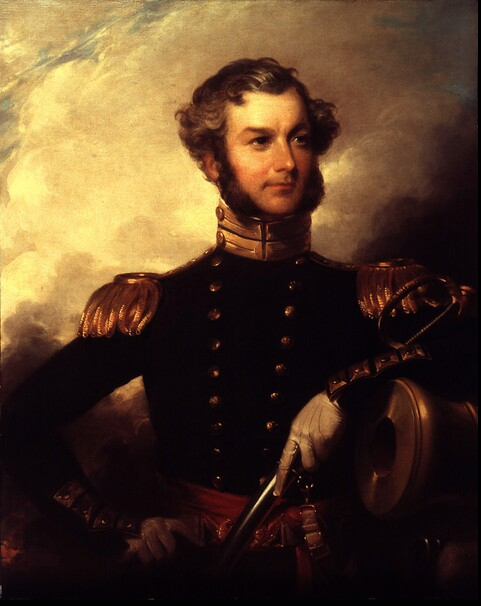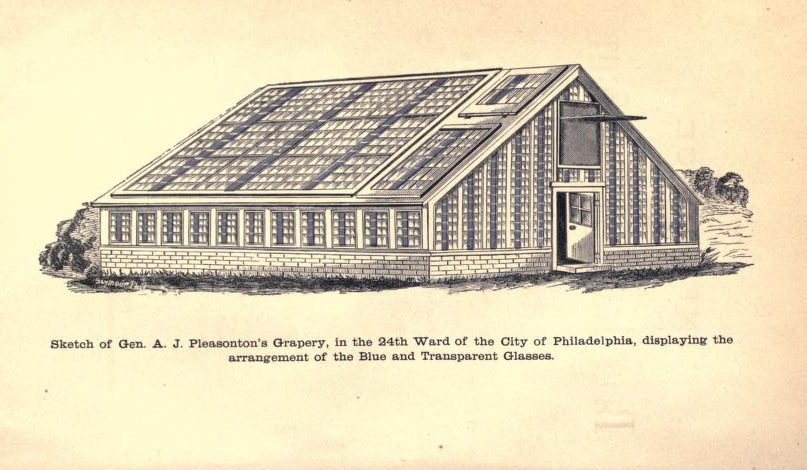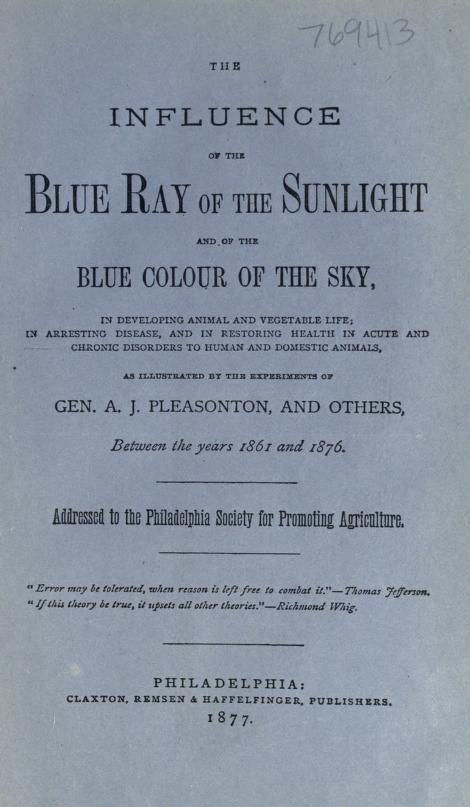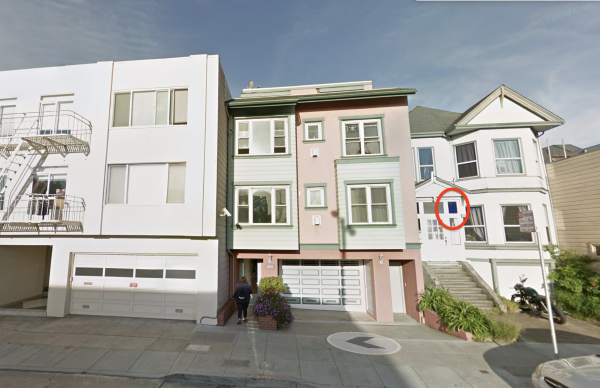The Cerulean Process by Emmett Fitzgerald
US history is filled with stories of medical quackery. And while most cure-alls were elixirs sold in bottles, we came across a strange, architectural panacea. For a brief time, back in the 1870s, some people thought that blue windows were the solution to just about every medical problem you could think of. The main purveyor of this belief was a Civil War general named August Pleasanton.

Pleasanton was something of an armchair scientist, and in between his military duties, he would read lots of books on physics and botany. Over time he developed some pretty strange opinions, but his strangest was about the color blue.“I have long thought that the blue color of the sky, so permanent and all-pervading […] must have some abiding relation and intimate connection with the living organisms on this planet,” Pleasanton declared. He began to argue that he could actually speed up growth in plants using blue light.
To test this hypothesis, Pleasanton built a giant greenhouse. It looked like a standard greenhouse, except that some of the panels in the roof were made of blue glass in order to let in a certain amount of “blue light.” In this “blue house” he grew grapes, and got some incredible results. He reported massive growth, huge vines and tons and tons of grapes.

After that initial success with grapes, Pleasanton started raising pigs and cows beneath blue glass panels. Word got out and soon he was being asked to give talks about his experiments. He extolled the virtues of blue light not just for raising grapes or pigs, but humans. He said that blue light caused an electrical current to flow through the body and invigorate the organs solving all kinds of physical deficiencies.

Pleasanton received a patent for his “cerulean process,” and he published a whole book about the value of blue light.
Pleasanton touted blue light as a cure-all for all sorts of human ailments—from skin conditions, to baldness, to insomnia. The book was popular, and soon people all over the country were demanding blue glass. “For about two years, 1876 and 1877, there [was] suddenly this huge fad for all things blue,” says Jenny Benjamin, curator of the Museum of Vision in San Francisco. People bought blue eye glasses and blue wallpaper, but the most common purchase was blue windows. People wanted to create a place in the house where you could go bathe in the blue light.
The “blue glass craze” was ultimately short-lived. Scientific American very publicly debunked Pleasanton’s wild claims, and people eventually stopped buying blue windows. There may still be some homes from that era out there with their original blue glass windows — we just haven’t found them yet!

Special thanks to Bart Bernhardt co-founder of Nerd Nite SF who wrote in with this story suggestion. https://sf.nerdnite.com/



Comments (17)
Share
umm, a solar powered flashlight isn’t exactly useless you know…
just in case Viv doesn’t get it, it charges when you don’t need it…
I would agree, especially during natural disasters it can be a pretty handy tool when there’s a mad rush to stock up on batteries.
I agree, especially for those living in areas that are prone to natural disasters such as Hurricanes they can be of great use.
Hello 99 PI,
Articles or principles of a manifesto or a constitution are tenets. Unless these principles are only contract residents of the doctrine, then they may be tenants.
Awesome story on the Prisoner. Go Trufelmans!
Re blue glass: I can’t see a window pane from the street view image, but there is a house in Berkeley that is clearly devoted to blue glass. The architecture looks old enough to me, but you’re the experts. You don’t even need to cross the bridge. Northeast corner of Milvia and Francisco.
The original 1966 yule log footage was found in a can and restored in 2016. Please correct this error.
Regarding the Yule Log segment: the Latin word for hearth is “focus”. Back in the old Roman days, I guess that’s about all there was to focus on sitting around your living room. So maybe it’s not such a stretch to think of a family staring into a fireplace.
Two of your stories in this episode made me feel my age. I watched The Prisoner when it was originally broadcast in the US in the 1960’s. I had seen Patrick McGoohan, the star, in another British series called, Secret Agent Man in the US and Danger Man in Britain. The Prisoner was very weird but I loved it.
Since we lived in New Jersey, we got WPIX, channel 11 and we always watched the Yule Log on Christmas Eve. I probably didn’t see the original log video but we always tried to identify where the loop ended.
You guys are fantastic! Really enjoyed the show! You made my day!!!
There’s a Victorian in SF where one of the apartments on the top level has nothing but blue glass. I’ve always wondered about it! Corner of Fulton and Cole — clearly visible in Google Streetview.
https://goo.gl/maps/3yDhjpdm5AD2
BBC R4 Extra has a radio adaptation of “The Prisoner” in progress: https://www.bbc.co.uk/programmes/m0001f39
And it was a sort of follow-on to McGoohan’s previous series, Danger Man (1960–68; retitled as Secret Agent in the US). That was a actual thriller program.
I grew up with the Yule log. There is a happy addition to the story. The original 1966 footage was discovered. https://pix11.com/2018/12/24/watch-the-wpix-yule-log-and-learn-the-history-of-the-famous-christmas-fireplace/
Love the log. But WPIX wasn’t/isn’t a UHF station. It was Channel 11, home to local kids’ shows (Officer Joe Bolton, Captain Jack McCarthy, Chuck McCann). Home also to The Honeymooners, in years and years of late-night repeats.
Listening to the Yule Log story reminded me of my favorite Christmas music album that our family had when I was young — all the hits by Percy Faith, The Ray Conniff Singers, Mormon Tabernacle Choir…none of the Mariah Carey nonsense.
Did Roman really not know what a Yule Log was?
Today with blue light
“Energy Saved, Sleep Lost: The Unintended Consequences of LED Lighting”
https://medium.com/@caseorganic/energy-saved-sleep-lost-the-unintended-consequences-of-led-lighting-c0909d4872d0
I totally sent you an email about Portmeirion :) Will shamelessly take the credit (pff Vaery’s ancient t-shirt :)) Love the show!